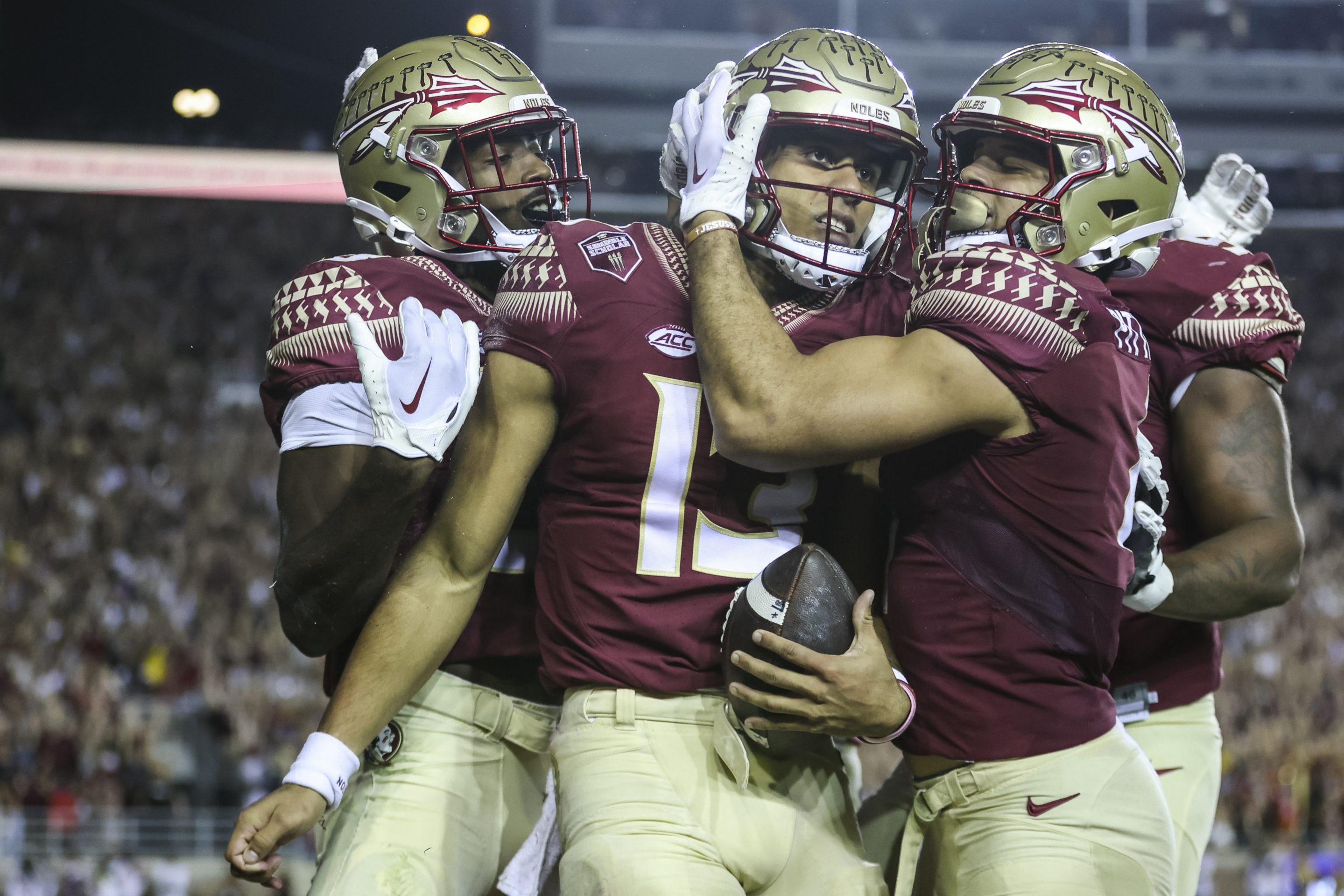The immediate question on most people's minds after Florida State president Richard McCullough announced on Wednesday that the school would "very seriously" consider leaving the ACC if there was no drastic change to its revenue distribution model was whether he and the school were bluffing. It's not like Florida State hasn't made it's desire to leave the conference known, and given that McCullough was speaking to his own board of trustees it seemed reasonable to assume he was talking as straight as anyone involved in big-time college sports ever does. But also, in a more basic sense, he was clearly just talking; Florida State is locked into a media rights contract that extends to 2036, and the ACC has already made it clear it would cost the school about $120 million to even begin to try to free itself from it.
So maybe it was both: FSU sure seems to be stuck, and yet they still feel like they can benefit from this kind of a bluff. And to show they mean business, the school is in talks with JP Morgan about getting private equity to pay their ACC exit fee. It's a move that would turn FSU's athletics into a private industry and likely speed up the arms race to professionalize and privatize college sports, and it feels worrying as such even if it, too, is just a feint.
This is where I must inform you that I am an alum and fan of Florida State, at least when they're not doing things that piss me off. I grew up in Tallahassee and have known FSU my whole life it feels like, so yes I am biased. With that said, I can still tell you this much: FSU has always seen itself as bigger and better than the ACC. FSU has also always had anxiety about whether it gets the respect it feels entitled to. A third true thing I can tell you is that FSU wants a lot more money than their boosters are capable of amassing, which is part but not all of why they feel shortchanged by being in a "lesser" conference.
They're not totally wrong on that last part. FSU football has the history and the national titles that an elite program should have. Although they'd spent half a decade as a middling program until a strong showing last year, fans could (and will) argue that it was just a small gap in an otherwise strong run. They've won a national title within the last 10 years, and they were in the inaugural College Football playoff game (let's not revisit what actually happened in that game). The point is, FSU has been one of the premier programs in the ACC, and they along with Clemson are a priority for the conference as a result. But thanks to that media rights deal that the school just signed, it doesn't have much leg to stand on when it comes to renegotiating a deal that better reflects its worth as people like McCullough understand it. For as highly as FSU football thinks of itself, it is an industry where money talks—and while certain schools like Alabama or even rival Florida can lean on their big money boosters to get them out of most of their binds, the inability to do the same is really what keeps FSU from the lofty perch it wants to place itself in.
Florida State has always been an overachiever, a former women's-only institution that developed a big-time football program thanks to the arrival of Bobby Bowden in 1976. While the school's boosters are solid, they're not extraordinary like those that bankroll LSU or Ohio State. The results don't always show up on the field, but they do show up. Money almost certainly played a role in losing Jimbo Fisher to Texas A&M, and it wasn't until after multiple losing seasons that the school finally agreed to upgrade its facilities to keep up with the bigger programs. College football has become an arms race, and FSU knows it needs to keep up. While they are correct that the ACC is holding them back to some extent, the gap the program needs to close between itself and its peers isn't the ACC's fault.
And that's how we end up with JP Morgan entering the picture. On Friday, it was reported that the university was working with the financial institution to find ways for the athletic program to raise funds through private equity in order to get itself both out of the ACC and into the economic tier occupied by the college football's true powerhouses. This follows a growing trend of Wall Street money entering sports like the NBA, F1, and golf, but there's something especially ominous about big finance being introduced to the already shady world of college sports.
The way it would work, on a basic level at least, involves spinning off private companies separate from the athletic department but aimed at athletic department goals; private equity would invest in that company, and then recoup its investment through future media and sponsorship deals. As with everything having to do with private equity, it sounds much simpler and neater in theory than it would probably be in practice. As with everything having to do with private equity, there are many reasons to be wary.
But if it feels shortsighted, it also feels inevitable given the mismatch between Florida State's aspirations and resources. FSU would essentially be the first to bust through a door that the NCAA was always going to open eventually. Wall Street's angle is easier to understand—big finance wants to put its hands on anything that makes money, and college football is one of the last billion-dollar enterprises in which it doesn't already have an interest. The reason for caution here is that Wall Street isn't just invested in profitable businesses, it's invested in constant growth, and to make a deal with that kind of devil means guaranteeing your own eventual demise. Nothing grows forever, at least not at the pace that Wall Street wants; at some point, conflict is inevitable. Hollywood is currently learning this lesson, painfully.
What makes FSU's fight with the ACC interesting is that it's a microcosm of where college football as a whole is headed. If the demise of the Pac-12 didn't already make it clear, college football is consolidating. We are headed for a sport ruled by one or two super conferences, which is a reality that could go any number of ways for fans but is certain to become very expensive for programs that want to compete. This kind of arms race goes beyond the continued fight over NIL and paying players; at the institutional level, the enticement of private equity riches was always going to become a necessity. That fire is already burning. Florida State just happened to show up first with the gasoline.






